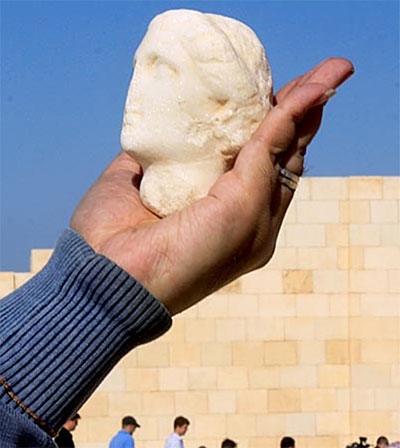2012 LGI Seed funding awarded to research project: Globalisation, materiality and the transference of cultures
The LGI is pleased to annouce that seed money has been granted to Dr. Miguel John Versluys (Archaeology), Prof. Caroline van Eck (Art History) and Prof. Pieter ter Keurs (Anthropology) for their research on Globalisation, materiality and the transference of cultures.

Research Group
The interdisciplinary research group of Prof. Pieter ter Keurs (Anthropology), Prof. Caroline van Eck (Art History), and Dr. Miguel John Versluys (Archaeology) will plan a workshop involving Leiden and international scholars to explore how to productively link research on globalisation with material culture studies. This juncture is one of the most promising and challenging perspectives being developed within the Humanities and Social Sciences at present. Their proposal strengthens and builds on this perspective by putting cultural transference as central to its approach, with the explicit aim to use both “globalisation” and “materiality” for historical analysis.
Research questions
How do the processes of construction and transference of culture look when considered not from the insiders’ perspective of those involved in transferring the classical tradition out of Greece and Rome to other parts of the world, based on a belief in the superiority of its aesthetics and immaterial associations, but as a matter of choice, that is of stylistic selection, appropriation and the construction of culture? More in particular, what happens when we shift our perspective from patrons, artists or outstanding art works to that of material culture, and the agency of objects? And what happens if we do this in combination with a broadening of scope from “the Classical” and include other culture-styles apparently having a strong and world-wide agency, like “Egypt”, “China” or “the Primitive”. Why are some culture-styles so much more persistent than others? Can we speak of a material basis of culture transmission, and if so, how can we study it? How, for instance, can we develop a better understanding of the success or failure of the use of culture styles, by focusing on the agency of the objects used instead of the agendas of their patrons or makers, and their intended aims?
Research strategy
This research project will consider these fundamental questions in two ways:
In the first place we will look at the transference of culture in a comparative and global perspective by analysing the construction and transference of four major cultural traditions (the Classical, Egyptian, Chinese and “the Primitive”) in terms of stylistic formation. Secondly, we will do so by focussing on a few material objects characteristic of these cultural traditions, and heavily laden with artistic, ideological, political or religious connotations: the column, the obelisk, the vase and/or pagoda and the mask. To gain a closer understanding, we will take the agency of these objects as a starting point for an understanding of their role in the transference and construction of culture. The framework of that understanding is that of the objects’ biography.
For a conceptual and theoretical framework, we will draw on the growing body of object theories under development in globalisation studies, anthropology, archaeology and art history (as illustrated, for instance, by Flood’s Objects of translation from 2009 or the recent volume of Kritische Berichte) and on Gell’s anthropological theory of art and agency, which through its central notions of the art index and agency conceived as a social phenomenon, plays a fundamental heuristic role in conceiving how the historical processes of material culture understood as consistent patterns of stylistic choice can be understood in a wider anthropological framework. The third main element of our theoretical framework will therefore be (recent) debates on style and culture styles (see Van Eck 1995 and the forthcoming volume L'idée du style/ L'idea di stile edited by Payne and others; already Assmann 1986). In other words, we propose to add significantly to existing knowledge and theories on globalization, interconnectivity and material culture by providing a focus and framework where these theories can meet: that of the agency of material culture in the context of the construction and transference of cultures, considered as consistent patterns of (stylistic) appropriation and agency. Until now (and perhaps because of the relative weakness of the chapter on style in Gell’s book, which was left incomplete at his death) such a connection between agency, material culture and culture styles has not yet been proposed. It does offer though a common ground where globalisation scholars, historians, archaeologists, anthropologists and art historians can meet.
The workshop
We aim to organise, towards the end of 2012, an international workshop with seed-money from the profile area. The workshop will have the format of a two-day expert meeting, held at the Academy Building and at the museums of Antiquity and Ethnography in front of objects. During the expert meeting, the Leiden researchers will present papers in which they outline this new research project and connect it to a particular object in the Leiden museum collections. A groups of invited international experts will be asked to react critically to these papers and to comment on the extended research proposal. On the basis of this work we are aiming, in 2013, to set up an inter-faculty, trans-disciplinary research seminar on the theme of this proposal, to make this seminar part of different teaching programs, and to prepare for an NWO/ERC Grant.
